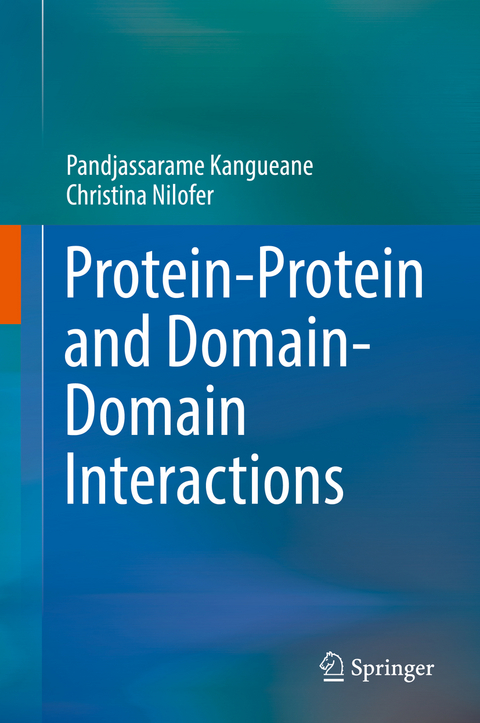
Protein-Protein and Domain-Domain Interactions
Springer Verlag, Singapore
978-981-10-7346-5 (ISBN)
Dr. Pandjassarame Kangueane is Director of Biomedical Informatics (P) Ltd, India, Chief Editor, Bioinformation, India and Associate Editor, BMC Bioinformatics, UK. He served as a professor at the Department of Biotechnology at AIMST University, Malaysia (2009-2011), visiting professor at VIT University, India (2007-2009), assistant professor at NTU, Singapore (2002-2006) and visiting scientist (S*Bio Pte Ltd) at the Chiron Corporation (2001), USA. His research interest is in bioinformatics and biotechnology, particularly HLA-based peptide vaccine design, protein-protein interactions, lipase (an enzyme) engineering and genome biology. He has received various prestigious awards, notably the Indian Leadership award for Industrial Development from the All India Achievers Foundation, Vishal Bharathi award with the Bharath Jothi award from the GOPIO, France and was made an Ambassador for Peace by the Universal Peace Federation for his contribution to science and technology. He hasserved as referee for a number of international journals, including Bioinformatics (UK), Nucleic Acids Research (UK), Vaccines (USA), Plos ONE (USA), BMC Genomics (UK), the Journal of Molecular Modeling & Graphics (USA) and BMC Bioinformatics. He has more than 15 years of teaching experience in bioinformatics, bioprocess technology, biotechnology and computing. He has also published more than 50 research articles in peer-reviewed international journals and authored or co-authored numerous books and book chapters. He is a member of numerous international scientific societies and organizations, such as APBioNet, Singapore, the Agro Informatics Society and the Biomedical Informatics Society, India. Ms. Christina Nilofer is a scientist at Biomedical Informatics (P) Ltd. She continued her postgraduate studies at Stella Maris College (Autonomous), Madras University, Chennai, India and is currently completing her doctorate in Biotechnology at VIT University, Vellore, India. She has served as researcher in biotechnology (Saksin Lifesciences (P) Ltd) and bioinformatics (Genome Life Sciences (P) Ltd) industries. She has authored and co-authored two book chapters and published two articles in peer-reviewed journals.
Module 1. Preface.- Module 2. Introduction to protein complexes.- Module 3. Historical advancement.- Module 4. Databases for protein complexes.- Module 5. Types of protein complexes.- Module 6. Hetero dimer protein complexes.- Module 7. Homo dimer protein complexes.- Module 8. Multimer protein complexes.- Module 9. Interfaces in protein complexes.- Module 10. Principles of protein-protein binding.- Module 11. Homodimer folding and binding.- Module 12. Gene fusion and protein complexes.- Module 13. Domain-domain interactions.- Module 14. Protein docking: Methods, software tools and servers.- Module 15. Protein complexes, pathways and networks.- Module 16. Protein complexes and biological functions.- Module 17. Protein complexes in diseases.- Module 18. Protein complexes in drug discovery & vaccine development.- Module 19. Protein complexes in genome and proteome analysis.- Module 20. Conclusions & challenges.
| Erscheinungsdatum | 11.03.2018 |
|---|---|
| Zusatzinfo | 82 Illustrations, color; 79 Illustrations, black and white; XIX, 207 p. 161 illus., 82 illus. in color. |
| Verlagsort | Singapore |
| Sprache | englisch |
| Maße | 155 x 235 mm |
| Themenwelt | Medizin / Pharmazie ► Medizinische Fachgebiete |
| Studium ► 2. Studienabschnitt (Klinik) ► Humangenetik | |
| Studium ► Querschnittsbereiche ► Infektiologie / Immunologie | |
| Naturwissenschaften ► Biologie ► Biochemie | |
| Schlagworte | domain-domain interactions • drug discovery • gene fusion • Protein complexes • protein-protein interactions • Vaccine development |
| ISBN-10 | 981-10-7346-5 / 9811073465 |
| ISBN-13 | 978-981-10-7346-5 / 9789811073465 |
| Zustand | Neuware |
| Haben Sie eine Frage zum Produkt? |
aus dem Bereich


